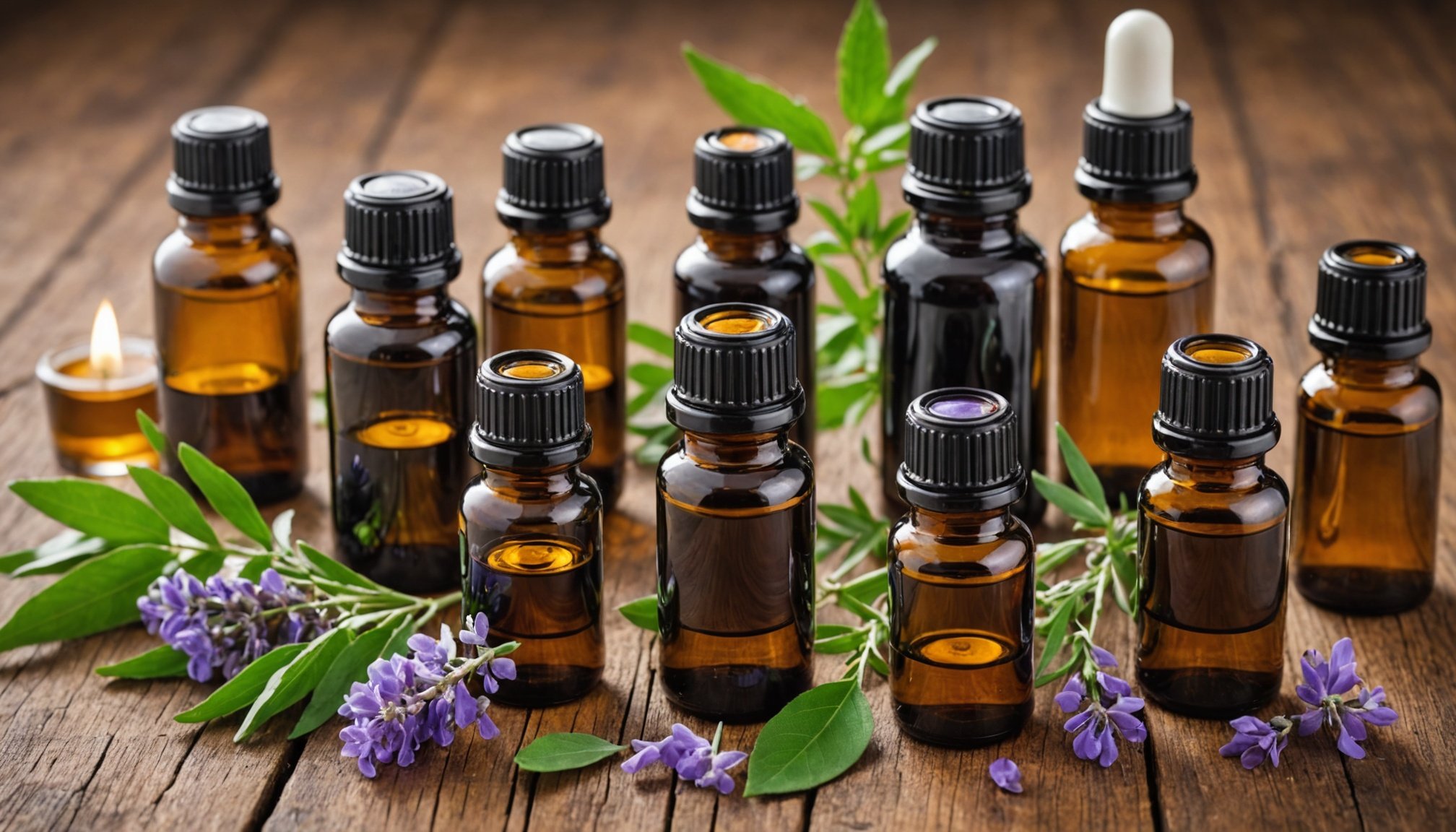Unlock the Secrets: Best Essential Oils for Scar Healing and Skin Renewal
When it comes to achieving healthy, radiant skin, many of us turn to various skincare products and treatments. However, one of the most effective and natural ways to promote skin health and heal scars is through the use of essential oils. These potent oils, derived from plants, offer a myriad of benefits that can transform your skincare routine. Here’s a comprehensive guide to the best essential oils for scar healing and skin renewal.
Understanding Essential Oils for Skin Health
Essential oils are highly concentrated plant extracts that have been used for centuries in traditional medicine and skincare. They are rich in antioxidants, vitamins, and other bioactive compounds that can deeply nourish and rejuvenate the skin.
Also to discover : Unveil nature”s top oils for deep nourishment and hydration of your dry scalp
How Essential Oils Work
Essential oils work by penetrating deep into the skin, where they can address various skin issues at the cellular level. Here are some key ways they help:
- Antioxidant Properties: Many essential oils, such as rosehip oil and lavender oil, are rich in antioxidants that combat free radicals, which can cause skin damage and aging[1][5].
- Anti-Inflammatory Effects: Oils like chamomile and oregano have anti-inflammatory properties that can reduce redness and irritation, making them ideal for sensitive or damaged skin[1][2].
- Hydration and Moisturizing: Essential oils like rosehip and lavender provide intense hydration, locking in moisture and combating dryness[1][5].
Best Essential Oils for Scar Healing
Scar healing is a complex process that requires the right combination of nutrients and therapeutic properties. Here are some of the best essential oils for this purpose:
In the same genre : Elevate your home office efficiency: the best aromatherapy scents to spark creativity and sharpen focus
Rosehip Oil
Rosehip oil is often referred to as a “miracle oil” for its regenerative properties. It is rich in vitamins A and C, which support the regeneration of the dermis, helping to improve skin texture and reduce the appearance of scars. Rosehip oil also protects the skin from ultraviolet damage, making it a valuable addition to any skincare routine focused on natural scar healing[1][3].
Lavender Oil
Lavender oil is excellent for minimizing scars, including acne scars. It promotes skin regeneration, reduces redness, and accelerates healing. Its antimicrobial and antifungal properties target acne-causing bacteria, preventing future breakouts and clearing pores. Lavender oil is also highly effective in managing chronic skin conditions such as eczema and psoriasis[5].
Tea Tree Oil
Tea tree oil is renowned for its antibacterial properties, which make it a top choice for acne and scars. It kills acne-causing bacteria while reducing redness and swelling. For scars, tea tree oil helps fade marks over time when diluted with a carrier oil and applied directly to the affected areas[1][3].
Frankincense Oil
Frankincense oil is a favorite for anti-aging routines but also has significant benefits for scar healing. It supports cell regeneration, reduces scars and blemishes, and promotes elasticity, leaving the skin with a more youthful and even texture[1].
Essential Oils for Skin Renewal
In addition to scar healing, essential oils can also play a crucial role in overall skin renewal. Here are some oils that are particularly effective:
Neroli Oil
Neroli oil is known for its luxurious scent and brightening effects. It enhances skin radiance by reducing dullness and improving overall tone. Neroli oil also fades dark spots and pigmentation, resulting in a more uniform complexion[1].
Evening Primrose Oil
Evening primrose oil is a powerhouse for hydration and radiance. It promotes skin elasticity and restores a healthy glow to dull or aging skin. This oil is particularly beneficial for maintaining youthful skin and improving its overall appearance[1].
Chamomile Oil
Chamomile oil is a gentle yet powerful oil that calms irritation, reduces redness, and aids in the healing of damaged skin. It is ideal for sensitive or dry skin and can be used to soothe and rejuvenate the skin[1].
Using Essential Oils in Skincare Routines
To get the most out of essential oils, it’s important to use them correctly. Here are some tips:
Dilution
Essential oils are highly concentrated and should always be diluted with a carrier oil before application. Common carrier oils include almond oil, jojoba oil, and shea butter. For example, you can dilute a few drops of tea tree oil in aloe vera gel or a carrier oil and apply it directly to affected areas[1].
Patch Testing
Before using any new essential oil, it’s crucial to patch test it on a small area of your skin to ensure compatibility. This helps prevent any adverse reactions or irritation[1].
Facial Steaming
Facial steaming with essential oils can be a highly effective way to cleanse and rejuvenate the skin. Oils like eucalyptus, peppermint, and oregano can be added to steam to promote skin health, combat acne, and nourish the skin[2].
Practical Tips and Recipes
Here are some practical tips and recipes to help you incorporate essential oils into your skincare routine:
Rosehip and Lavender Oil Blend
- Ingredients: 2 tablespoons of rosehip oil, 5 drops of lavender oil, 2 drops of frankincense oil.
- Instructions: Mix the ingredients in a small bowl. Apply the blend to your face and neck after cleansing. This blend is excellent for hydrating the skin, reducing scars, and promoting anti-aging benefits.
Tea Tree and Chamomile Oil Acne Treatment
- Ingredients: 1 tablespoon of aloe vera gel, 3 drops of tea tree oil, 2 drops of chamomile oil.
- Instructions: Mix the ingredients in a small bowl. Apply the blend directly to acne spots or areas of redness. This treatment helps in reducing acne, inflammation, and promoting healing.
Table: Essential Oils for Different Skin Concerns
| Essential Oil | Benefits | Suitable For |
|---|---|---|
| Rosehip Oil | Regenerative, hydrating, anti-aging | All skin types |
| Lavender Oil | Anti-inflammatory, antimicrobial, scar healing | Sensitive, dry, oily |
| Tea Tree Oil | Antibacterial, anti-inflammatory, acne treatment | Acne-prone, oily |
| Frankincense Oil | Anti-aging, cell regeneration, scar reduction | Mature, sun-damaged |
| Neroli Oil | Brightening, skin tone evening, anti-aging | Dull, tired skin |
| Evening Primrose Oil | Hydrating, radiance, skin elasticity | Dull, aging skin |
| Chamomile Oil | Soothing, anti-inflammatory, healing | Sensitive, dry skin |
| Eucalyptus Oil | Anti-inflammatory, antioxidant, skin cleansing | All skin types |
| Peppermint Oil | Cooling, antiseptic, detoxifying | Oily, combination skin |
| Oregano Oil | Antifungal, antibacterial, anti-inflammatory | Acne-prone skin |
Quotes and Expert Insights
- “Essential oils are a natural and effective way to promote skin health. They offer a range of benefits from hydration and anti-aging to scar healing and skin renewal,” says a skincare expert at Kaya.
- “Rosehip oil is a miracle oil for scars and spots. It supports the regeneration of the dermis, helping to improve skin texture and reduce the appearance of scars,” notes a dermatologist.
Essential oils are a powerful tool in any skincare routine, offering a natural and effective way to heal scars, promote skin renewal, and maintain overall skin health. By understanding the unique benefits of each oil and using them correctly, you can unlock the secrets to radiant, healthy skin.
Whether you’re dealing with scars, acne, or simply looking to improve your skin’s appearance, there’s an essential oil that can help. Remember to always dilute your essential oils, patch test them, and use them in conjunction with other skincare practices for the best results.
In the world of skincare, essential oils are more than just a trend; they are a timeless solution that can transform your skin and enhance your beauty routine. So, visit your local health store, explore the world of essential oils, and start your journey to healthier, more radiant skin today.











